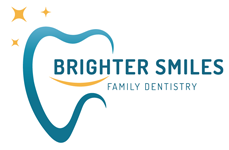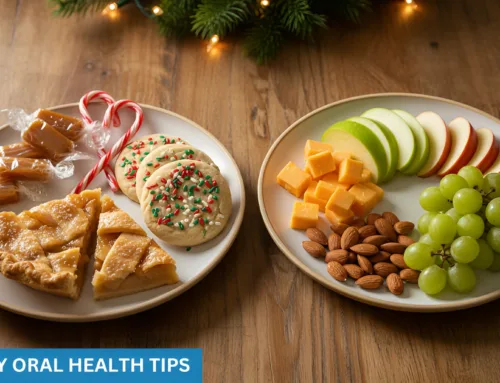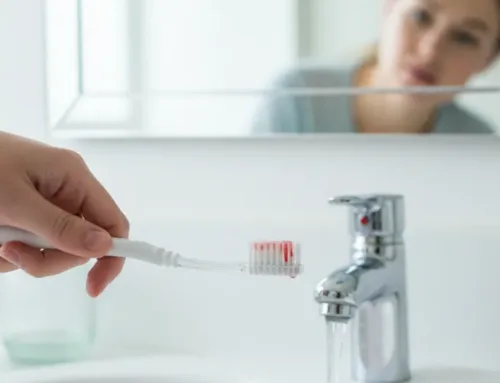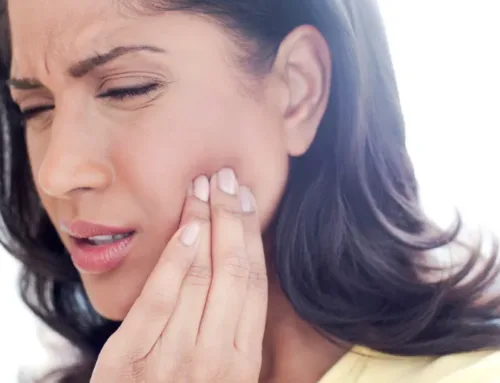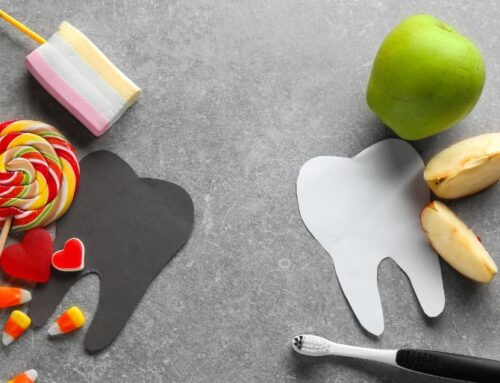From the notion that “sugar-free gum can replace brushing” to the myth that “whiter teeth are healthier,” dental myths are everywhere, clouding the truth about oral health. Dispelling these myths is essential, not just for your smile, but for your overall health.
Join us as we clear the fog of misinformation and lay down the hard dental facts, ensuring you have the knowledge to keep your teeth and gums in top shape.
Table of Contents:
Myth 1: The Harder You Brush, The Cleaner Your Teeth
Debunking dental myths starts with correcting common misconceptions. It’s a widespread belief that more pressure while brushing equals cleaner teeth. Yet, the truth is the opposite; gentle and thorough brushing is not only sufficient but recommended.
Brush Smarter, Not Harder:
Choose Soft Bristles: Swap your hard-bristled brush for a soft one. It’s like choosing a paintbrush over a scrub brush – both clean, but one does the job more gently and effectively.
Angle It Right: Angle your brush at 45 degrees to your gums. This isn’t just a pro tip; it’s the secret to reaching deep without being harsh, ensuring you gently whisk away plaque without aggravating your gums.
Gentle Circles, Not Scrubs: Treat your teeth like delicate artifacts that need careful cleaning. Use soft, circular motions rather than vigorous back-and-forth scrubs. Think of it as massaging your gums and teeth to health.
Time It Right: Spend a full two minutes on your teeth, dividing your time equally among all areas. It’s not just about doing it; it’s about doing it right. Those two minutes are a mini-vacation for your teeth, where they get pampered and cleaned thoroughly.
What’s the Risk of Overbrushing?
Wear and Tear on Enamel: Brushing too hard is like sanding down wood; eventually, you wear down the surface. Your enamel isn’t replaceable, so treat it gently.
Gum Recession Blues: Push too hard, and your gums might start to retreat from your teeth, exposing sensitive roots and increasing discomfort.
Hello, Sensitivity: As enamel wears and gums pull back, your teeth might start complaining when you enjoy hot coffee or a cold ice cream.
Cavity Gateway: With less enamel protection and more root exposure, your teeth become prime targets for cavities.
Remember, effective brushing is about finesse, not force. By brushing thoughtfully, you protect your smile from the myths that can lead to real dental woes.
Myth 2: Tooth Loss Is Only Genetic
Think losing your teeth is all written in your DNA? Not quite. While your genes do play a role in your dental health, there’s a whole lot more to the story that you can influence.
Breaking Down the Influences:
It Starts with Genetics: Yes, your genetic makeup might predispose you to certain oral health conditions, but it’s far from being the whole picture. Consider it the backdrop against which many other factors play out.
Mind Your Meals: Each snack and drink has an impact. High sugar and acidic foods can be harsh on your teeth, speeding up enamel erosion and leading to decay. Opt for nourishing choices that safeguard your dental health.
Consistent Oral Hygiene: Think of daily brushing and flossing as your dental defense strategy. Regularly cleaning your teeth wards off common enemies like cavities and gum disease, which are primary causes of tooth loss.
Watch Out for Vices: Smoking and regular heavy drinking can escalate gum disease, weakening the foundations of your teeth. Reducing these habits can substantially lower your risk of dental complications.
Dental Visits are Crucial: Keeping up with your dental appointments allows your dentist to spot and manage minor issues before they escalate into major problems. It’s all about prevention and timely intervention.
Lifestyle Choices Matter:
Your genes aren’t the boss of you. By taking charge of your daily habits and making consistent, health-conscious decisions, you significantly lower the risks that contribute to tooth loss.
Let’s bust this myth together: proactive, preventive care makes a huge difference. Remember, preserving your smile is about the smart choices you make every day, not just your genetic blueprint.
Myth 3: Natural and Artificial Sugars Have Different Effects on Teeth
Many believe that sugars from natural sources like fruits are less damaging to teeth compared to sugars found in processed foods. However, the truth is that all types of sugars can be harmful to dental health if not managed properly.
Understanding Sugar’s Impact on Teeth:
Sugar and Tooth Decay: Both natural and artificial sugars can contribute to tooth decay by feeding the bacteria in your mouth. This bacteria produces acid that attacks tooth enamel.
Frequency vs. Quantity: It’s not just about how much sugar you consume, but how often. Frequent snacking on sugary foods can be more harmful because it gives bacteria more opportunities to produce harmful acids.
Sticky Situations: Sticky sugars, whether from dried fruit or candy, cling to teeth longer, increasing the risk for cavities.
Debunking Myths About Natural Sugars:
“Healthier” Isn’t Safer: Foods labeled as containing natural sugars, like honey or agave nectar, can still lead to decay if consumed in large amounts.
Fruit Misconceptions: While fruits are an important part of a healthy diet, the natural sugars they contain can still affect your teeth. It’s best to rinse with water or brush your teeth after consuming high-sugar fruits like grapes or bananas.
Smart Ways to Protect Your Smile:
Snack Smart: Choose snacks like crisp apples or celery sticks. These aren’t just low in sugars; they actually help scrub your teeth as you chew, promoting a natural cleanse.
Stick to Your Brushes: Whether it’s honey or hard candy, brushing twice a day and flossing are your best defenses against any sugar. Make these habits as routine as checking your phone in the morning.
Tailor Your Dental Visits: Regular check-ups are your strategy sessions. Your dentist isn’t just checking for cavities; they’re customizing your defense against sugar’s sneak attacks.
By understanding the real effects of sugars on our teeth, we can make better dietary choices that protect our dental health, debunking the myth that natural sugars are automatically better for our teeth.
Myth 4: Dental X-Rays Are Unsafe
Some people skip x-rays at the dentist’s office out of safety concerns. However, modern dental x-rays are incredibly safe and a crucial tool in dental health management.
Why X-Rays Are Needed:
Early Detection: X-rays provide a detailed view of your oral health, catching issues like decay, abscesses, or bone loss before they become visible or painful.
Treatment Planning: They help dentists plan complex procedures, such as orthodontics, implant placement, and root canals, ensuring treatments are both safe and effective.
Advancements in Dental Radiography:
Lower Radiation: Modern digital x-rays use significantly less radiation compared to traditional methods. The amount of radiation in a routine set of dental x-rays is equivalent to the natural radiation you’re exposed to in just a few days from your natural environment.
High Precision: Digital x-rays provide clearer images for a better diagnosis while using less radiation, making them an excellent choice for regular monitoring.
Safety Precautions: Lead aprons and thyroid collars are routinely used to protect your body from any stray radiation during the process.
Debunking the Myth:
Comparative Risk: The minimal radiation from dental x-rays is considered negligible compared to their significant benefits in preventing more serious dental issues.
Regulated and Safe: Dental practices follow strict guidelines to ensure x-rays are performed safely, minimizing any risk to patients.
Understanding the importance and safety of dental x-rays can change how you view your visits to the dentist. They are a vital tool that provides essential information not just about your teeth, but your overall oral health, playing a crucial role in keeping your smile bright and healthy.
Myth 5: Flossing Isn’t as Important as Brushing
Think brushing your teeth gives you a free pass to skip the floss? Let’s bust this myth right now: flossing is an all-star player in your dental hygiene lineup.
Why You Can’t Miss Flossing:
Between the Lines: Your toothbrush does a great job on the surface, but it’s the spaces between your teeth where trouble brews. Flossing whisks away the pesky leftovers and lurking plaque that your brush can’t reach.
Shield Your Gums: Floss acts like a sentinel for your gums, cutting down the plaque that could turn into tartar and lead to gum disease. Think of it as preventive care for keeping your smile intact.
Overall Health Hero: Good flossing doesn’t just brighten your smile—it’s integral to your overall health. Clearing out those hidden nooks and crannies helps ward off oral bacteria that can influence diabetes and heart disease.
Debunking the Flossing Myths:
Indispensable, Not Optional: Skipping floss is like skipping the conditioner in your hair-care routine: you’re just not getting the full clean that your body needs.
Bleeding Gums Need More Love, Not Less: If flossing makes your gums bleed, it’s a wake-up call that they need more attention, not less. Regular flossing often leads to healthier gums and less bleeding over time.
Flossing Made Easy:
Find Your Fit: Not all floss is created equal. Whether it’s waxed, unwaxed, or dental tape, find what feels good and works best for your teeth.
Gentle Does It: Treat your gums like the delicate tissue they are. Gently slide the floss between your teeth, hug it around each tooth, and slide up and down to clean effectively.
Make It a Habit: Incorporate flossing into your nightly routine. Those few minutes before bed are your chance to reset and prep your mouth for a healthy tomorrow.
By integrating flossing into your daily routine, you ensure that your mouth—and your body—stays healthier. Let’s get past the myths and bring flossing into the spotlight it deserves. It’s not just about keeping your dentist happy; it’s about keeping you healthy.
Myth 6: You Don’t Need Regular Dental Visits Unless You Have Symptoms
Think you only need to see the dentist when you’re in pain or something feels off? This approach could put your oral health at risk. Regular dental check-ups are crucial, not just for solving problems, but for preventing them.
Why Regular Dental Exams are Crucial:
Spotting Hidden Problems: Dental check-ups are not just about fixing problems but preventing them. Dentists can identify issues like early decay, gum inflammation, and more before they escalate into major concerns.
Essential Preventive Care: Regular visits help control plaque and tartar buildup that daily brushing can miss. Cleanings during these visits are vital to keeping your mouth healthy and avoiding conditions that lead to pain and complex procedures.
Risks of Waiting for Symptoms to Appear:
Small Problems Become Big Ones: Many dental issues aren’t visible or painful initially. By the time symptoms appear, the condition may have worsened, requiring more complex intervention.
Costlier in the Long Run: Addressing dental problems only after symptoms develop can often lead to more extensive and expensive treatments compared to maintaining regular visits.
How Regular Visits Protect Your Dental Health:
Educational Benefits: Each dental visit is an opportunity to learn. Dentists can show you how to effectively clean your teeth and point out areas you might be missing.
Prevention Over Cure: Routine examinations can catch potential problems early, often leading to simpler, more conservative treatment options that save you time, discomfort, and money in the long run.
Remember, visiting your dentist should not be driven by the presence of symptoms. Embracing a schedule of regular check-ups is a proactive approach to dental care that ensures your smile stays bright and healthy. This myth of waiting for pain or discomfort before seeing a dentist could end up costing you more in the long run, both for your health and your wallet.
Myth 7: Chewing Gum Is a Good Substitute for Brushing
While popping a piece of gum after a meal can freshen your breath and feel cleansing, it’s important to know that it doesn’t replace brushing your teeth.
Understanding the Role of Chewing Gum in Oral Hygiene:
Temporary Perks: Popping a piece of sugar-free gum stimulates saliva flow, which naturally helps cleanse the mouth by washing away loose food particles and buffering the acids produced by dental plaque. This benefit is particularly useful when you can’t brush immediately after eating.
Understanding Its Limits: However, chewing gum should not be seen as a replacement for brushing and flossing. It lacks the ability to effectively scrub off plaque, which if left unchecked, leads to tooth decay and gum disease.
When Chewing Gum Helps and When It Doesn’t:
Beneficial Use: Chewing sugar-free gum can be effective after meals or snacks when brushing isn’t possible. It’s particularly useful in situations where you need to manage dry mouth or need a quick refresh of your breath.
Insufficient Alone: Relying solely on gum as a method of oral hygiene is inadequate. Gum does not reach between teeth or clean the gum line effectively, two critical areas where gum disease starts and cavities can form.
Integrating Gum into a Comprehensive Oral Care Routine:
As an Adjunct, Not a Replacement: Consider gum as a complement to brushing and flossing, not a substitute. It can be part of your oral hygiene toolkit, especially when used in combination with regular brushing and dental visits.
Choosing the Right Gum: Opt for sugar-free gum with xylitol, a sweetener that can help reduce decay-causing bacteria in the mouth. However, remember that even the best gum doesn’t clean teeth as thoroughly as a toothbrush.
By understanding the real benefits and limitations of chewing gum, you can make informed decisions about your oral health routine. Remember, nothing replaces the effectiveness of brushing with fluoride toothpaste and flossing daily. Chewing gum can be a helpful addition, but it’s no substitute for the fundamentals of good oral hygiene.
Myth 8: Whiter Teeth Are Healthier Teeth
Many believe that a sparkling white smile is the ultimate indicator of healthy teeth. However, tooth color alone does not determine dental health.
Understanding Tooth Color Variations:
Natural Shades: Teeth naturally come in a range of shades and can darken over time. Factors like genetics, age, and the thickness of enamel play significant roles in the color of your teeth.
External Influences: Certain foods, beverages (like coffee, tea, and red wine), and smoking can stain teeth. While external stains might affect appearance, they don’t necessarily indicate poor health.
Health Beyond Whiteness:
Enamel Health: Healthy teeth have strong enamel, regardless of color. Over-bleaching can actually weaken enamel, making teeth more susceptible to decay.
Gum Condition: Healthy gums are essential for healthy teeth. Red, swollen, or bleeding gums are indicators of problems, no matter how white the teeth are.
Regular Check-Ups: A dentist’s assessment is crucial as they look beyond color, checking for decay, alignment, and gum health.
When Whitening Is Beneficial:
Confidence Boost: If whitening makes you feel more confident, it can be beneficial. However, it should be done safely under professional guidance to avoid damaging your teeth.
Special Occasions: For special events, whitening can enhance your smile aesthetically, but remember, it’s cosmetic and doesn’t equate to solving or masking underlying issues.
Integrating Whiteness and Health:
Seek Expert Advice: Jumping into teeth whitening? First, have a chat with your dentist. They’re your best resource for choosing treatments that brighten safely, ensuring your smile shines without harming your enamel.
Holistic Dental Care: A brilliant smile starts with solid basics: regular brushing, thorough flossing, and consistent dental checkups. These steps are your foundation for a healthy, dazzling smile.
By dispelling the myth that whiter teeth are inherently healthier, we can focus on what truly matters for oral health. It’s important to care for your teeth comprehensively, ensuring they are not only aesthetically pleasing but fundamentally healthy.
Myth 9: Crowns, Fillings, and Other Procedures Guarantee Future Protection
It’s a common belief that once you have a crown, filling, or other dental restoration, the tooth is protected against future dental issues. However, this isn’t entirely true. Understanding the maintenance required and the limitations of these procedures is crucial for ongoing oral health.
Maintenance Is Key Even After Dental Work:
Continued Care Required: Dental restorations can protect the structure of a damaged tooth, but they do not make the tooth invincible. Regular care, such as brushing, flossing, and routine check-ups, is essential to maintain both the integrity of the dental work and the health of surrounding teeth.
Lifespan of Dental Work: Fillings, crowns, and other restorations have a lifespan and may eventually need to be replaced. Factors such as wear and tear, and how well you care for them, can significantly influence their longevity.
Common Misconceptions About Dental Restorations:
Permanent Solution Myth: Many patients mistakenly believe that once a tooth is treated with a filling or crown, it no longer requires special attention. On the contrary, these teeth can still experience decay, particularly at the margins where the restoration meets the natural tooth.
Protection Against All Decay: Restorations do not protect against decay in other untreated parts of the tooth or surrounding teeth. Oral hygiene and dietary habits continue to play a crucial role in preventing new cavities.
Integrating Dental Work Into Overall Oral Care:
Routine Follow-Ups: Regular visits to the dentist are crucial. These allow your dentist to monitor the condition of restorations and the overall health of your mouth.
Preventive Measures: Using fluoride toothpaste, reducing sugary snacks, and regular flossing are vital practices to extend the life of dental work and protect your natural teeth.
By dispelling the myth that dental restorations provide total protection, we can encourage a more comprehensive approach to oral health care. It’s important to remember that proactive, preventive care doesn’t stop with the placement of a filling or crown; it’s an ongoing commitment to keep your entire mouth healthy.
Myth 10: Cavities in Baby Teeth Don’t Matter
It’s a misconception that cavities in baby (primary) teeth are unimportant because these teeth eventually fall out. However, the health of baby teeth can significantly impact a child’s overall oral development and health.
Consequences of Cavities in Baby Teeth:
Discomfort and Challenges: Cavities in baby teeth can be as painful as those in adult teeth, impacting a child’s ability to eat, speak clearly, and focus in educational settings.
Risk of Severe Infections: Untreated cavities don’t just stop at tooth pain; they can escalate into significant infections, potentially affecting a child’s general health.
Crucial Role in Dental Development: Baby teeth are placeholders for adult teeth. When they decay and fall out too early, the resulting space issues can lead to misaligned permanent teeth, often necessitating advanced orthodontic treatments.
Why Caring for Baby Teeth is Crucial:
Early Habits Set the Stage: Teaching children to care for their teeth from a young age helps establish healthy dental habits for a lifetime.
Preventing Future Problems: Good care of baby teeth can prevent the spread of decay that might otherwise damage the permanent teeth developing beneath them.
Importance of Regular Checkups: Regular dental visits for children are essential to monitor the health of their teeth and to teach parents and children about effective oral hygiene practices.
Building Healthy Dental Routines for Little Ones:
Begin Early: Start your child on a path to good oral health even before the first tooth emerges. Gently wiping your baby’s gums with a soft, moist cloth can help clear away harmful bacteria. Once those tiny teeth start showing, use a child-friendly, soft toothbrush and just a dab of toothpaste to clean them gently but effectively.
Smart Snacking: Keep those sweet treats in check. Encourage snacks that are kind to teeth, like slices of apples or carrot sticks, which help keep plaque at bay. Teaching kids to enjoy healthier options early on lays the groundwork for strong, cavity-resistant teeth.
Embrace the Dentist Early: Make the dentist a familiar, friendly face for your child by starting dental visits by their first birthday or as soon as the first tooth pops through. Regular check-ups are not just about spotting problems early—they’re also about making the dentist’s office a routine part of your child’s world.
Understanding the importance of baby teeth helps dispel the myth that cavities in these teeth do not matter. By ensuring our children’s primary teeth are healthy, we are setting the foundation for a lifetime of good oral health.
Conclusion: Take Charge of Your Dental Health
As we’ve debunked these widespread dental myths, one thing has become crystal clear: maintaining oral health isn’t just about brushing and avoiding sweets; it involves a deeper understanding and commitment to practices that foster long-term health benefits, both dental and overall.
From the myths around gum as a brushing substitute to the critical care needed for baby teeth, each point has emphasized the importance of informed and proactive dental care. Remember, taking care of your teeth is more than a daily routine—it’s integral to your overall health, and neglecting it can have far-reaching consequences.
Prioritize Preventive Care
Don’t delay your dental visits until discomfort or visible issues force your hand. Scheduling regular check-ups is crucial to maintaining optimal oral health and heading off potential problems before they develop into significant concerns. Proactive dental care helps ensure your smile stays bright and healthy, steering clear of emergencies.
Consult Your Dental Professional
If you have questions about optimal dental care or need tailored advice, consulting a dental professional is essential. For those in the West Des Moines area, consider Brighter Smiles Family Dentistry for dedicated, expert care designed to keep your smile healthy and vibrant.
By staying informed and proactive about dental health, you’re not just ensuring a brighter smile; you’re paving the way for better overall health. Remember, investing in your dental care today is an investment in your health for years to come.


